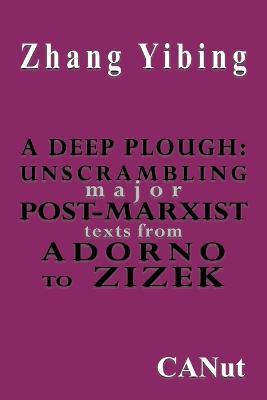A Deep Plough: Unscrambling Major Post-Marxist Texts. from Adorno to Zizek

A Deep Plough: Unscrambling Major Post-Marxist Texts. from Adorno to Zizek
The post-Marxian philosophy boasts of its historical transcendence over the basic framework of Marxism, which is not different from the post-modern Marxism in terms of historical ontology: they are built on the transcendence of the modern by the post-modern. The post-Marxian philosophers believe that the foundation of social history, on which Marxism is built, will be inevitably reduced to the residue of history. An entirely new social civilization is supposed to come up with a heterogeneous reality for this radical criticism. Therefore, most of the post-Marxian thinkers criticize Marx from a certain perspective while constructing their own critical platform, for example, Baudrillard, with his Mirror of Production and For a Critique of Political Economy of Sign published in the 1970s. As a student of Lefebvre, Baudrillard is also influenced by Roland Barthes and Guy Debord In Society of Spectacle, Debord rewrites the beginning of Marx's Capital, in which "an immense accumulation of spectacle" replaces Marx's "immense accumulation of commodities." From the Society of Spectacle to The Consumer Society, the commodity exchange of Marx is turned into the exchange of signs. The mirror of production on which Marx relies is broken while the fantasy of post-modern media becomes the real ruler in today's capitalist society. In addition, Baudrillard declares the death of modernity and industry (the mode of material production), which also accounts for his refutations of Marxism. The latest events include Mark Poster's replacement of Marx's mode of production with his mode of information and Zizek's adoption of the Lacanian symptoms in place of Marx's material relations. In general, the post-Marxian philosophy attempts to stride beyond the old Marxist domain, which is a significant heterogeneity in theory. This book is the second volume of the two volume book written by Zhang Yibing; the first volume includes classical Western Marxism texts, and this second includes what he calls "post-Marxian" texts. Born in 1956, he belongs to the second generation of scholars studying "Western Marxism" philosophy in the Mainland China. His first article was published in 1982 and in the second half of 80'ies, he started his books. Zhang Yibing, has chosen a brand new method for China -textual studies- which was very rarely applied. With his sharp critical reflections, and deep background investigation on how those thinkers have developed their ideas, he is one of the outstanding
PRP: 167.40 Lei
Acesta este Prețul Recomandat de Producător. Prețul de vânzare al produsului este afișat mai jos.
150.66Lei
150.66Lei
167.40 LeiIndisponibil
Descrierea produsului
The post-Marxian philosophy boasts of its historical transcendence over the basic framework of Marxism, which is not different from the post-modern Marxism in terms of historical ontology: they are built on the transcendence of the modern by the post-modern. The post-Marxian philosophers believe that the foundation of social history, on which Marxism is built, will be inevitably reduced to the residue of history. An entirely new social civilization is supposed to come up with a heterogeneous reality for this radical criticism. Therefore, most of the post-Marxian thinkers criticize Marx from a certain perspective while constructing their own critical platform, for example, Baudrillard, with his Mirror of Production and For a Critique of Political Economy of Sign published in the 1970s. As a student of Lefebvre, Baudrillard is also influenced by Roland Barthes and Guy Debord In Society of Spectacle, Debord rewrites the beginning of Marx's Capital, in which "an immense accumulation of spectacle" replaces Marx's "immense accumulation of commodities." From the Society of Spectacle to The Consumer Society, the commodity exchange of Marx is turned into the exchange of signs. The mirror of production on which Marx relies is broken while the fantasy of post-modern media becomes the real ruler in today's capitalist society. In addition, Baudrillard declares the death of modernity and industry (the mode of material production), which also accounts for his refutations of Marxism. The latest events include Mark Poster's replacement of Marx's mode of production with his mode of information and Zizek's adoption of the Lacanian symptoms in place of Marx's material relations. In general, the post-Marxian philosophy attempts to stride beyond the old Marxist domain, which is a significant heterogeneity in theory. This book is the second volume of the two volume book written by Zhang Yibing; the first volume includes classical Western Marxism texts, and this second includes what he calls "post-Marxian" texts. Born in 1956, he belongs to the second generation of scholars studying "Western Marxism" philosophy in the Mainland China. His first article was published in 1982 and in the second half of 80'ies, he started his books. Zhang Yibing, has chosen a brand new method for China -textual studies- which was very rarely applied. With his sharp critical reflections, and deep background investigation on how those thinkers have developed their ideas, he is one of the outstanding
Detaliile produsului











